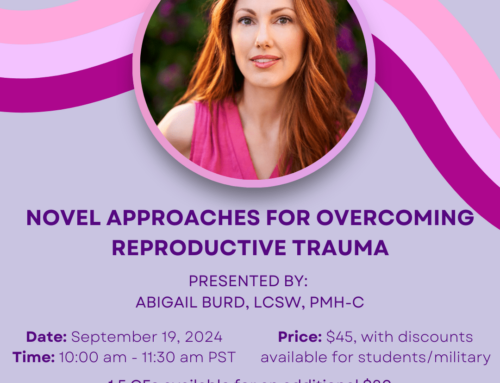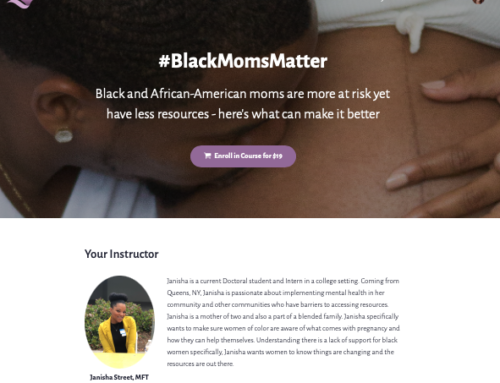Here’s some big news for perinatal mental health: a national panel just released a report that depression during pregnancy and postpartum can be PREVENTED with evidenced-based counseling. KSWB-TV brought me back for a sixth time to explain. You can watch a clip here.
Perinatal depression is a big problem
Depression and anxiety during pregnancy and postpartum is a big problem, not just for 1 in 5 women, but for their partners and children as well. We’ve talked before about stigma – that’s the fear of embarrassment that keeps us from telling our friends, “this is tough” or “I’m struggling.” Fortunately, more new parents have been getting real and sharing openly and honestly about their struggles.
Even better, the medical community is FINALLY noticing, too. OB/GYNs have always been good about screening blood pressure and urine, but postpartum depression is the single most common complication of childbirth. Last year ACOG updated their postpartum protocol to check in with moms more and to ask about both mental and physical health. Now we want systems to prevent mood and anxiety disorders.
What is the US Preventative Services Task Force?
The United States Preventative Services Task Force is an independent group of national experts in prevention medicine that works to improve the health of all Americans by making evidence-based recommendations about clinical preventive services such as screenings and interventions.
They systematically looked at all of the possible interventions – not just to treat perinatal depression – but to actually PREVENT it. Because, how great could it be if those 1 in 5 parents didn’t get depressed in the first place? They did a systematic review of several known ways to treat and prevent perinatal depression.
And what can prevent perinatal depression?
They looked at exercise, medication, education, breastfeeding support, sleep coaches, yoga, expressive writing, birth story debriefing (and don’t get me wrong, all of that can be helpful and I often recommend them). But the only two interventions proven to have a sizable effect in preventing the likelihood that a woman would develop postpartum depression were the two types of counseling or psychotherapy they studied.
We often use both Interpersonal Psychotherapy (or IPT) and Cognitive Behavioral Therapy (CBT) to TREAT perinatal depression and anxiety. And both were shown to significantly help prevent the likelihood that someone even gets depressed.
I have to say this report is thrilling to me personally — this is exactly what I have been doing with my clients 1:1 for years. How great is it to have a systematic review of high quality studies backing up two of my favorite interventions?

So what does this mean for the average woman going to a prenatal visit?
If you have gone to the doctor in the last year or two, you may have already noticed that there has been more screening for depression and anxiety. Two years ago, I shared the Preventative Services Task Force recommendation that all adults, and especially pregnant and postpartum women, be screened for depression.
The amazing part is that classifying evidenced-based counseling as a preventive service means there should be no cost and no copay to receive it! For example, your health care system is required to provide widely accepted “preventative” health care, such as a flu shot or an annual physical, at no cost to you. And the US Preventative Services Task Force is the authority that decides which preventative services are best practice.
Now, I am not in the position to say what this is ultimately going to look like. As a clinical social worker, I would love a world where everyone gets free counseling. (We might finally have world peace…) But wearing my realistic hat, I’m sure they will try more cost-effective modes of delivery such as group counseling sessions or even online counseling. And I could easily imagine mental health finally being offered as one of the free classes that are offered during pregnancy.
And how great is that??? I have worked in mental health for over 20 years now. Yet, as a first time mom, I felt as though I had no clue how hard it would be emotionally. No one prepared me. My health care system offered free classes for baby care basics, breastfeeding 101, and even how to introduce your dog to your baby (seriously). Why shouldn’t they start to scratch the surface on the single most common complication of childbirth?
Sources:
American College of Obstetricians and Gynecologists. Optimizing postpartum care. ACOG Committee Opinion No. 736. Obstet Gynecol 2018;131:e140–50.
Belluck, P. “Depression During and After Pregnancy Can Be Prevented, National Panel Says.” The New York Times. Feb 12, 2019, retrieved 2/19/19
Kaiser Family Foundation. Preventive Services Covered by Private Health Plans under the Affordable Care Act, retrieved 2/19/19
O’Connor E, Senger CA, Henninger ML, Coppola E, Gaynes BN. Interventions to Prevent Perinatal Depression: Evidence Report and Systematic Review for the US Preventive Services Task Force. JAMA.2019;321(6):588–601. doi:10.1001/jama.2018.20865
US Preventive Services Task Force, Curry SJ, Krist AH, Owens DK, Barry MJ, Caughey AB, Davidson KW, Doubeni CA, Epling JW Jr, Grossman DC, Kemper AR, Kubik M, Landefeld CS, Mangione CM, Silverstein M, Simon MA, Tseng CW, Wong JB. Interventions to Prevent Perinatal Depression: US Preventive Services Task Force Recommendation Statement. JAMA. 2019 Feb 12;321(6):580-587.
Photo by Beka Tasmagambet on Unsplash
Video clip from the KSWB-TV 2/21/19 morning news is used with permission.






What are your thoughts?